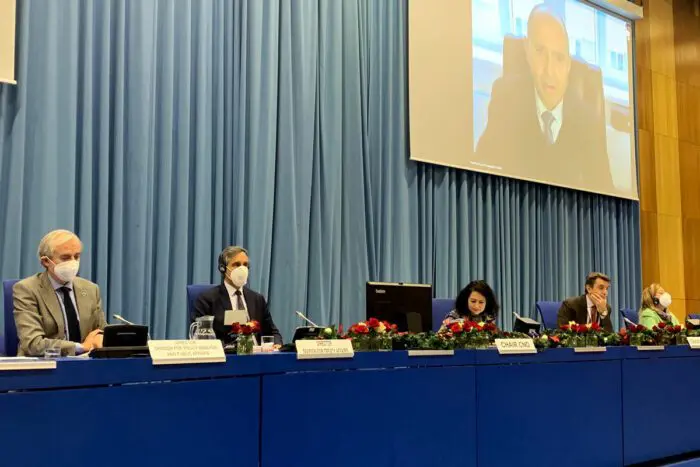© UNODC
Commission on Crime Prevention and Criminal Justice (CCPCJ) and Commission on Narcotic Drugs (CND) held end-of-the-year meetings on tackling most pressing global challenges posed by drugs and crime
Vienna (Austria), 10 December 2021 — The United Nations’ two policymaking bodies, the Commission on Narcotic Drugs (CND) responsible for drug-related matters and the Commission on Crime Prevention and Criminal Justice (CCPCJ) covering the field of crime prevention and criminal justice held their annual, end-of-the-year, or reconvened sessions at the UN in Vienna this week.
The agenda of these meetings traditionally has a focus on budgetary and administrative matters, as the Commissions also serve as governing bodies of UNODC, and as such, approve the budget of the UN international drug control programme and the UN crime prevention and criminal justice fund, respectively.
The reconvened session of the CCPCJ was chaired by Alessandro Cortese, Permanent Representative of Italy to the UN in Vienna. During the thematic discussion held on the first day of the session, Member States, UN entities, as well as intergovernmental and non-governmental organizations discussed measures to prevent and counter the smuggling of migrants while protecting their rights, particularly those of women and children and unaccompanied migrant children.
The reconvened session of the CND was chaired by Dominika Krois, Permanent Representative of Poland to the UN in Vienna. Member States discussed, among others, matters related to the implementation of the international drug control treaties.
In addition to the budgetary and administrative issues, the two Commissions also discussed, at the joint meeting held on 9 December, [RF1] matters related to the contributions by the Commissions to the work of the Economic and Social Council and the implementation of the 2030 Agenda for Sustainable Development.
During the respective separate meetings on 10 December, each Commission adopted a resolution on the consolidated budget of UNODC for 2022-2023 as well as a decision and a resolution on the extension of the mandate of the standing open-ended intergovernmental working group on improving the governance and financial situation of the Office (FINGOV).
* *** *
The CND is the main policymaking body of the United Nations with principal responsibility for drug-related matters. The CCPCJ is the main policymaking body of the United Nations in the field of crime prevention and criminal justice and is working to improve international action to combat national and transnational crime and the efficiency and fairness of criminal justice administration systems.
The resolutions and decisions of both Commissions provide guidance in their respective areas and create fora for Member States to exchange knowledge and good practices in addressing and countering the world drug problem and in strengthening crime prevention and criminal justice, respectively, and work to advance the implementation of the 2030 Agenda for Sustainable Development. The CND and CCPCJ also serve as governing bodies of UNODC.







